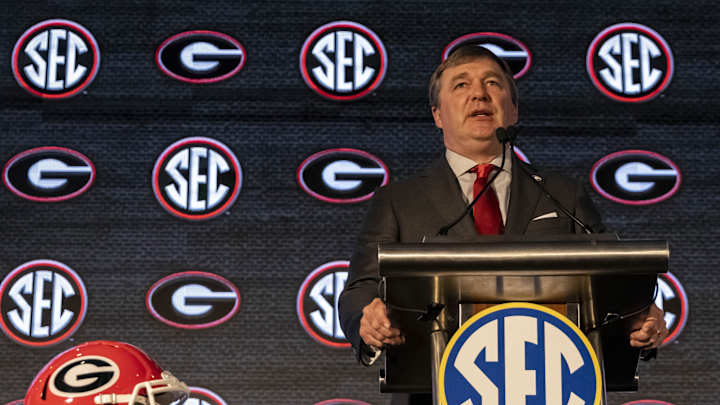EXTRA POINTS: Is a Supersized SEC good for college football?

Mr. CFB (Tony Barnhart) and A Jersey Guy (Mark Blaudschun) both love college football, but their viewpoints are often different. We at TMG are going to explore that more this season.
A Jersey Guy: Former Boise State football coach Dan Hawkins once expressed an interesting philosophy of life to me, including a view of college football: Bigger is not necessarily better, better is better.
So it will come to pass that the Southeastern Conference, generally regarded as the best conference in college football, will add Oklahoma and Texas, perhaps as soon as next season.
That's good for the SEC, which can envision the cash flow which will come in from a new television contract.
But is it better for the rest of college football?.
No.
Here's why.
The first reaction is that the other conferences will have to respond and expand, perhaps creating a Power 4 of 16 to 20 teams in super conferences.
And with that, instead of divisions, we will have pod groupings of four or five teams.
That is not college football.
That's the NFL--light--with the NFC East, West. North and South.
College football always has been a regional sport. Conference expansion wiped out the Eastern block identity.
Now the SEC is carrying it to another level. Are Missouri, Texas A&M, Texas and Oklahoma in the SOUTHEAST?
Is Louisville anywhere near the ATLANTIC COAST?
Are Colorado and Utah remotely linked to the Pacific Coast (without an earthquake).
The SEC was fine at 14 teams, without Texas and Oklahoma.
It was good enough, better was better.
Bigger?
Nope.
Mr. College Football
While I appreciate the passion from my esteemed colleague, A Jersey Guy could not be more wrong on this particular topic.
A wise man once told me that when it comes to conference expansion and reallignment, you're either on offense or you're on defense.
And you don't want to be on defense.
I would point out to A Jersey Guy that the SEC, to paraphrase the great Billy Joel, didn't start this fire. If we're going to be completly honest, which Jersey Guy likes, Texas and Oklahoma decided long ago they were tired of carrying the rest of the Big 12 conference financially. They were tired of playing big games (like the 50th anniversary of the Oklahoma-Nebraska Game of the Century) at 11 a.m. Eastern time because their televion partners were so inflexible.
They could look down the road and see that they were not getting stronger but were treading water--at best
"It became obvious that standing pat would mean falling behind," said Joe Castiglione, the athletics director at Oklahoma.
So Texas and OU started looking for another home. And it was entirely logical that they would call the SEC first. And if the SEC said "no" Texas and OU would walk down the street and talk to the Big Ten, which would have taken them faster than you can say "Jim Delany (the former commissioner)."
So the SEC made the deal which makes the nation's strongest, most competitive conference even stronger.
With all of that as background, we return to the original question: "Is a supersized SEC good for college football?"
The answer is yes because the SEC is leading college football to a place where it needs to go if it wants to continue to thrive in a 21st century marketplace. The pandemic, I have learned from smart people, takes trends already in place and accelerates them. College football was already due for some more contraction. This just moves it along.
In the age of NIL, the transfer portal, a 12-team college football playoff, and a revamped NCAA, each conference has to do what it can to strengthen itself to take on this brave new world. The SEC simply leading the way. Now the other conferences have to decide if they will follow.
As the late, great Bobby Bowden once said: "Son, this train is leaving the station. You have to decide if you want to be on it."
